外研版(新标准)英语七年级下册《Module 11 Body language》检测试题及答案
- 格式:doc
- 大小:116.00 KB
- 文档页数:12
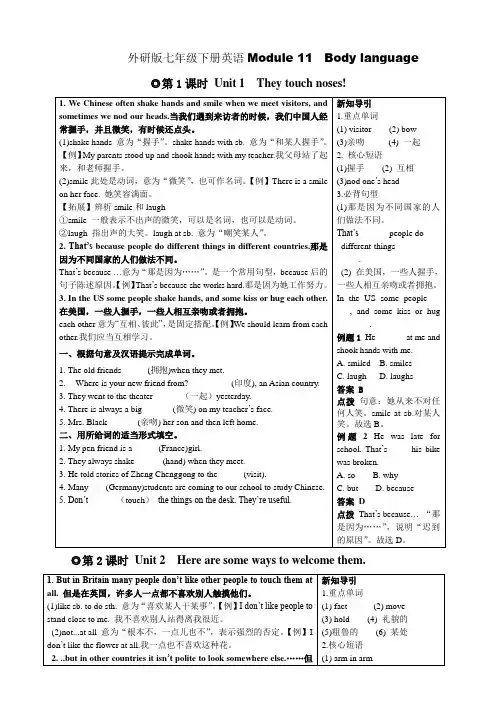
外研版七年级下册英语Module 11 Body language ◎第1课时Unit 1 They touch noses!1. We Chinese often shake hands and smile when we meet visitors, and sometimes we nod our heads.当我们遇到来访者的时候,我们中国人经常握手,并且微笑,有时候还点头。
(1)shake hands 意为“握手”。
shake hands with sb. 意为“和某人握手”。
【例】My parents stood up and shook hands with my teacher.我父母站了起来,和老师握手。
(2)smile此处是动词,意为“微笑”,也可作名词。
【例】There is a smile on her face. 她笑容满面。
【拓展】辨析smile和laugh①smile 一般表示不出声的微笑,可以是名词,也可以是动词。
②laugh 指出声的大笑。
laugh at sb. 意为“嘲笑某人”。
2. That’s because people do different things in different countries.那是因为不同国家的人们做法不同。
That’s because …意为“那是因为……”。
是一个常用句型,because后的句子陈述原因。
【例】That’s because she works hard.那是因为她工作努力。
3. In the US some people shake hands, and some kiss or hug each other. 在美国,一些人握手,一些人相互亲吻或者拥抱。
each other意为“互相、彼此”,是固定搭配。
【例】We should learn from each other.我们应当互相学习。
一、根据句意及汉语提示完成单词。
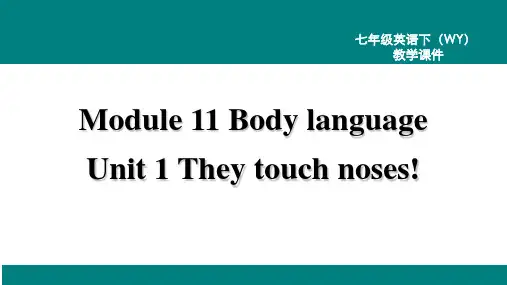
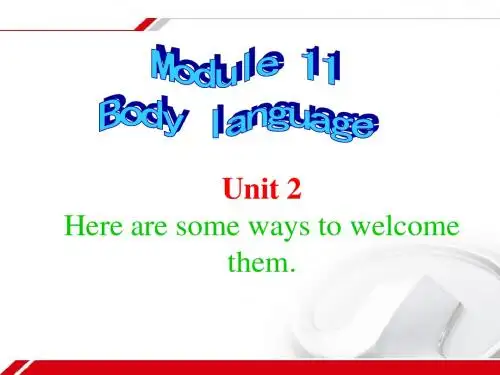
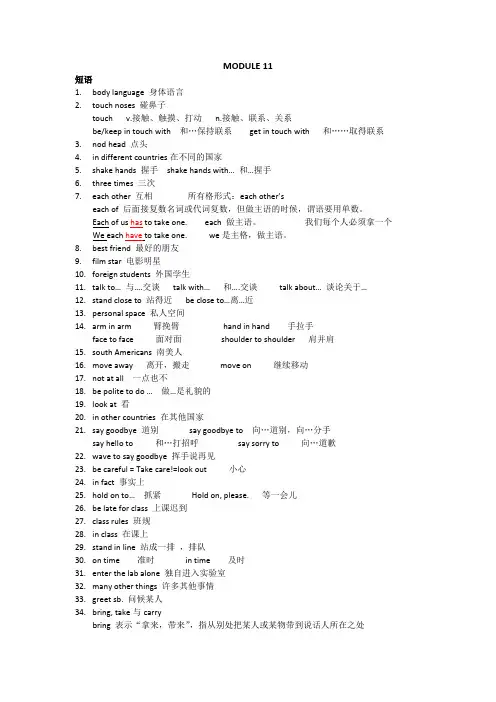
MODULE 11短语1.body language 身体语言2.touch noses 碰鼻子touch v.接触、触摸、打动n.接触、联系、关系be/keep in touch with 和…保持联系get in touch with 和……取得联系3.nod head 点头4.in different countries在不同的国家5.shake hands 握手shake hands with… 和…握手6.three times 三次7.each other 互相所有格形式:each other’seach of 后面接复数名词或代词复数,但做主语的时候,谓语要用单数。
Each of us has to take one. each 做主语。
我们每个人必须拿一个We each have to take one. we是主格,做主语。
8.best friend 最好的朋友9.film star 电影明星10.foreign students 外国学生11.talk to… 与….交谈talk with… 和….交谈talk about… 谈论关于…12.stand close to 站得近be close to…离…近13.personal space 私人空间14.arm in arm 臂挽臂hand in hand 手拉手face to face 面对面shoulder to shoulder 肩并肩15.south Americans 南美人16.move away 离开,搬走move on 继续移动17.not at all 一点也不18.be polite to do … 做…是礼貌的19.look at 看20.in other countries 在其他国家21.say goodbye 道别say goodbye to 向…道别,向…分手say hello to 和…打招呼say sorry to 向…道歉22.wave to say goodbye 挥手说再见23.be careful = Take care!=look out 小心24.in fact 事实上25.hold on to… 抓紧Hold on, please. 等一会儿26.be late for class 上课迟到27.class rules 班规28.in class 在课上29.stand in line 站成一排,排队30.on time 准时in time 及时31.enter the lab alone 独自进入实验室32.many other things 许多其他事情33.greet sb. 问候某人34.bring, take与carrybring 表示“拿来,带来”,指从别处把某人或某物带到说话人所在之处take 表示“带走,拿走”,指从说话人所在地把某人或某物带走或拿走carry仅表示“携带,带着”,不含方向句子:1. That’s because people do different things in different countries. 那是因为不同国家的人们做法不同。
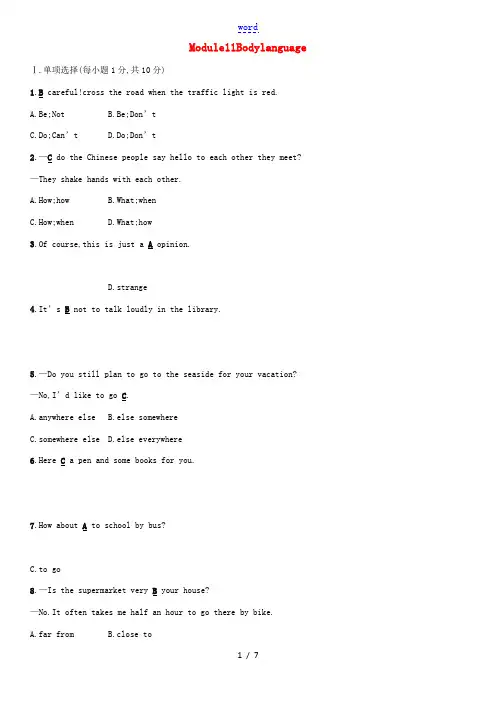
Module11Bodylanguage Ⅰ.单项选择(每小题1分,共10分)1.B careful!cross the road when the traffic light is red.A.Be;NotB.Be;Don’tC.Do;Can’tD.Do;Don’t2.—C do the Chinese people say hello to each other they meet? —They shake hands with each other.A.How;howB.What;whenC.How;whenD.What;how3.Of course,this is just a A opinion.D.strange4.It’s B not to talk loudly in the library.5.—Do you still plan to go to the seaside for your vacation? —No,I’d like to go C.A.anywhere elseB.else somewhereC.somewhere elseD.else everywhere6.Here C a pen and some books for you.7.How about A to school by bus?C.to go8.—Is the supermarket very B your house?—No.It often takes me half an hour to go there by bike.A.far fromB.close toC.close fromD.far to9. Her foreign teacher es from B,and he speaks.A.German;GermanB.Japan;JapaneseC.Russian;RussiaD.British;English10.—Do you know why he failed?—I think that’s A he was too careless.Ⅱ.完形填空(每小题1分,共10分)We use body language to send messages to others.It is very 11.A because others can understand you easily when you use body language.When you are talking with others,you are not just using words,but also using 12.B.For example,waving one’s hand is to say “Good-bye”.Shaking hands means wele,and clapping hands 13.C congratulations(祝贺).Nodding the head means YES,but shaking the head means NO.Different countries have 14.D body language.For example,when in 15.A,France and Arab countries,people kiss each other when they meet,16.C men in China or Australia shake hands.People in Puerto Rico like touching each other,but people in Britain do not touch each other.People in Arab countries like 17.D close to one another when they are talking,but English people must keep a distance away when they are talking.It is very important 18.C the meanings of gestures and movements in the foreign country 19.B they will help you municate with people and make you stay there much more 20.D and fortable.111213.A.to mean14.A.the same B.a sameC.the different15 B.the RussiaD.a Russia161718C.to know1920Ⅲ.阅读理解(每小题2分,共20分)APeople in different countries greet each other in different ways.Here are some. TheUnitedStatesPeople shake hands when they meet for the first time.Friends and family members often hug or kiss on the cheek(脸颊) when they see each other.Korea(韩国)Men bow and shake hands to greet each other.Women do not usually shake hands.If you address someone,you should use his or her full name.The family name es first,and then the first name.Finland(芬兰)Finns(芬兰人) greet each other with a handshake.Hugs and kisses are only for close friends and family members.ThePhilippines(菲律宾)The everyday greeting for friends is a handshake for both men and women.Men sometimes pat each other on the back.21.In which country do men sometimes pat each other on the back?AA.The Philippines.B.Finland.C.Korea.D.The United States.22.Which of the following is TRUE?BA.People shake hands whenever they meet in the United States.B.In the Philippines,friends shake hands as the everyday greeting.C.Finns greet each other with a bow.D.In Korea,the first name es before the family name.23.Of the four pictures(a,b,c,d),which is the same way to greet each other in the four countries?D24.In this passage,all the following are mentioned EXCEPT C.25.What does the writer want to tell us in the passage?AA.Different ways of greeting.B.Four countries.C.Friends and family members.nguages.BMy mother used to ask me what the most important part of the body was.I got different answers at different ages.When I was young,I thought sound was very important to us,so I said,“My ears,Mum.” But she shook her head and said no.Several years passed,and she asked me again.I believed that I got the right answer after thinking it over.So I told her,“Sight is very important to everyone,so it must be our eyes.” But she told me I was wrong.I tried many times after that,but her answer was always the same.Till last year,my grandma died.Everybody was crying,and everybody was hurt.My mom looked at me and asked me with tears in her eyes,“Do you know the answer now?” I was surprised when she asked me this question then.“Myson,the answer is your shoulder.Everyone needs a shoulder to cry on(倾诉的对象).”Finally,I realized (意识到)all she hoped is that I can have enough love and friends so that I will have a shoulder to cry on I when I need it.26.According to the passage,D are the most important part of the body.B.cars27.The writer gave B to the same question at different ages.A.the same answerB.different answersC.four answersD.the right answer28.The underlined word “Sight” means D in Chinese.A.听力B.嗅觉C.触觉29.B gave the right answer to the question at last.A.The writer’s fatherB.The writer’s motherC.The writerD.The writer’s grandma30.The writer got the right answer on the day when A.A.his grandma diedB.somebody was hurtC.his mother was cryingD.he was youngⅣ.词语运用(每小题1.5分,共15分)A.根据首字母或汉语提示完成句中单词。
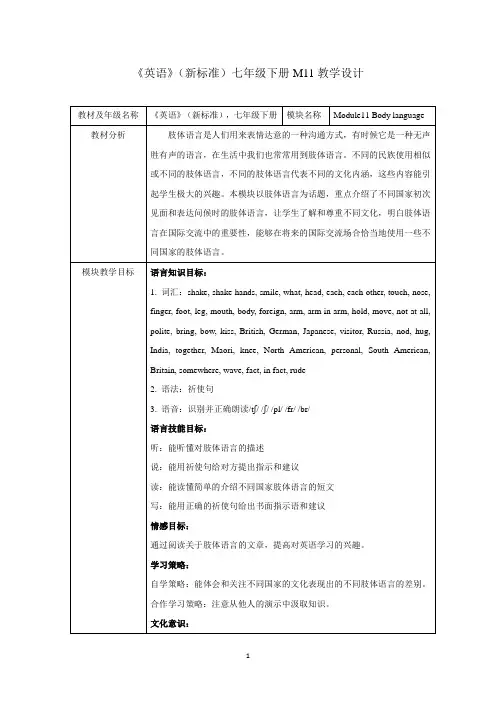
《英语》(新标准)七年级下册M11教学设计Step 4After-reading1.课文复述(借助图片)With the beginning: Here are some ways to welcomeforeigners.How close do you stand when you talk to a friend?people in Middle Eaststand close to…but don’t… North Americanspersonal spaceHow about touching people?Chinese girlswalk arm in armSouth Americans… hold armBut in Britain many peopledon’t like…Do you look at people when you talk?In some places, it isn’t polite to…; In othercountries, … look somewhere e lse. In Britain and theUS, people usually…And how do you say goodbye?从上个环节到这个环节的教学,以整进整出的形式输入输出知识,培养学生整体感知语言的能力和概括语言的能力。
复述课文是提高学生综合运用语言能力的一种训练,这也是学习语言和我们的教学目标之一。
复述内容设计要有梯度,应尽量兼顾不同层次学生的需求。
…wave to say goodbye… But be…in Greece. In fact, it’s very rude.2.竞赛(操练祈使句)Make a list of class rules in the school by using imperative sentences.Like this: Do sth. / Don’t do sth.1) 以组为单位,集体讨论后,根据本班实际情况,用祈使句形式列举本班规则,内容包含dos and don’ts。
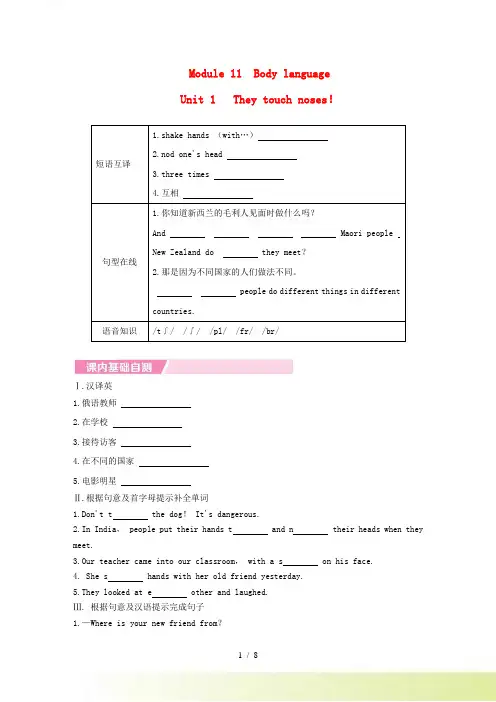
Module 11 Body language Unit 1 They touch noses!短语互译1.shake hands (with…)2.nod one's head3.three times4.互相句型在线1.你知道新西兰的毛利人见面时做什么吗?And Maori people New Zealand do they meet?2.那是因为不同国家的人们做法不同。
people do different things in different countries.语音知识/t∫//∫//pl/ /fr/ /br/Ⅰ.汉译英1.俄语教师2.在学校3.接待访客4.在不同的国家5.电影明星Ⅱ.根据句意及首字母提示补全单词1.Don't t the dog! It's dangerous.2.In India, people put their hands t and n their heads when they meet.3.Our teacher came into our classroom, with a s on his face.4. She s hands with her old friend yesterday.5.They looked at e other and laughed.Ⅲ. 根据句意及汉语提示完成句子1.—Where is your new friend from?—(印度), an Asian country.2.There is always a big (微笑) on our teacher's face.3.Mrs Black (亲吻) her son and left home in a hurry.4. (那是因为) you got up late this morning.5.Please the red apples (把……放在一起).6.They often (点头) when they meet.Ⅳ.用所给词的适当形式填空1.They (kiss) each other and said goodbye.2.These two (German) are my new friends.3.Mr Li didn't say anything, but just (nod) his head.4.Thousands of (visit) come to visit the Summer Palace every day.5.I (meet) my pen friend tomorrow.6.Russians speak (Russia).7.Look! The little boy (smile) at his father.8.Tom shakes (hand) with his friend to welcome her coming.9. (hug) is a kind of body language.10.Each (have) his own hobby.11.Can you speak (Japan)?12.There are some differences between American English and(Britain) English.Ⅴ.按要求完成句子1.This teacher comes from Russia.(改为同义句)This is a .2.My father likes Beijing Opera because he thinks it is very interestingW. (对画线部分提问)your father Beijing Opera?3.You should speak English in class.(改为祈使句)English in class.4.We met her at the airportW.(对画线部分提问)Where you her?5.She often takes a walk after dinner. (用last year改写句子)She often a walk after dinner last year.6.Maori people touch noses when they meet. (对画线部分提问)Maori people when they meet?7.I go swimming three times a weekW. (对画线部分提问)you go swimming?8.We're going to have some Russian teachers at school tomorrow. (改为同义句)We some Russian teachers at school tomorrow.9.People put their hands together and nod their heads in this country.(改为否定句)People their hands together nod their heads in this country.10.Body language means different things in different countries. (改为一般疑问句)body language different things in different countries?Ⅵ.根据汉语意思完成句子1.他们正在拥抱彼此。
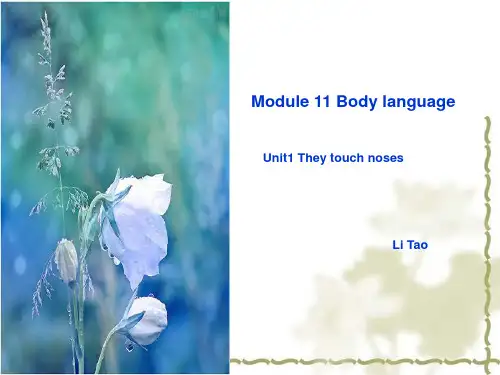
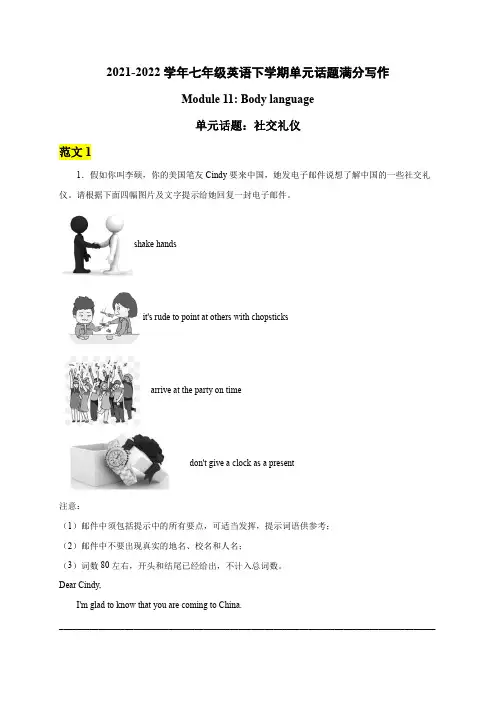
2021-2022学年七年级英语下学期单元话题满分写作Module 11: Body language单元话题:社交礼仪范文11.假如你叫李硕,你的美国笔友Cindy要来中国,她发电子邮件说想了解中国的一些社交礼仪。
请根据下面四幅图片及文字提示给她回复一封电子邮件。
shake handsit's rude to point at others with chopsticksarrive at the party on timedon't give a clock as a present注意:(1)邮件中须包括提示中的所有要点,可适当发挥,提示词语供参考;(2)邮件中不要出现真实的地名、校名和人名;(3)词数80左右,开头和结尾已经给出,不计入总词数。
Dear Cindy,I'm glad to know that you are coming to China.____________________________________________________________________________________________________________________________________________________________________________ ______________________________________________________________________________________ ______________________________________________________________________________________ ______________________________________________________________________________________范文22.在八年级即将结束之际, 八(1) 班将举行一次主题班会, 要求同学们谈谈一年来自己的收获与变化。
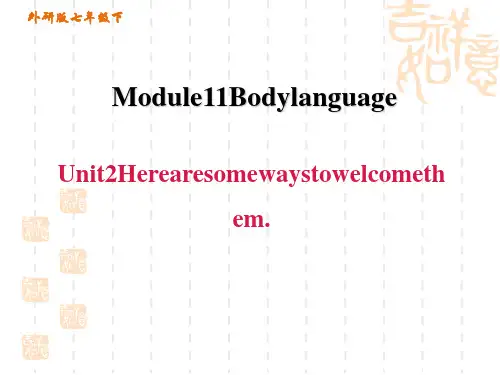
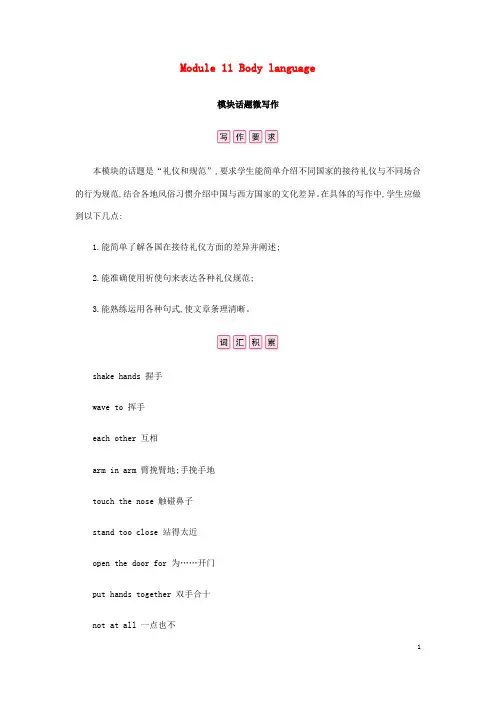
Module 11 Body language模块话题微写作本模块的话题是“礼仪和规范”,要求学生能简单介绍不同国家的接待礼仪与不同场合的行为规范,结合各地风俗习惯介绍中国与西方国家的文化差异。
在具体的写作中,学生应做到以下几点:1.能简单了解各国在接待礼仪方面的差异并阐述;2.能准确使用祈使句来表达各种礼仪规范;3.能熟练运用各种句式,使文章条理清晰。
shake hands 握手wave to 挥手each other 互相arm in arm 臂挽臂地;手挽手地touch the nose 触碰鼻子stand too close 站得太近open the door for 为……开门put hands together 双手合十not at all 一点也不in fact 事实上1.We Chinese often shake hands and smile when we meet visitors,and sometimes we nod our heads.我们中国人见到来访者的时候经常握手、微笑,有时候点头示意。
2.That’s because people do different things in different countries.那是因为不同国家的人做法不同。
3.Our new foreign students are going to arrive very soon,and here are some ways to welcome them.我们的外国新生很快就要到了。
下面是迎接他们的一些方式。
4.How close do you stand when you talk to a friend?当你和朋友交谈时站得有多近呢?5.Chinese girls often walk arm in arm with their friends.中国女孩常常和朋友臂挽着臂一起走。
教学设计their meanings.活动意图说明通过图片导入新课,图片展示的肢体语言贴近生活,学生对课堂产生兴趣,为后面的更多的肢体语言学生做铺垫。
环节二教师活动2Step2: Homework checkingThe homework : watch a short video and complete the sentences. Show maps of different countries, and let students complete the sentences.Learn new words: shake hands, bow, kiss, hug, together, nod head, touch noses...1.In China, Chinese_________(握手)and _______(微笑). When we meet visitors, we _____________(点头).2.In Russia, Russians _________(亲吻)three times, left right and left.3.In India, Indians put theirs hands________(一起),and nod heads. 学生活动2Look at the map of the word and try to complete the sentences and read loudly.And get the new words:shake hands, bow, kiss, hug, together, nod head, touch noses...1. In China, Chinese_________(握手)and _______(微笑). When we meet visitors, we _____________(点头).2. In Russia, Russians _________(亲吻)three times, left right and left.3. In India, Indians put theirs hands________(一起),and nod heads.4. In America, Americans shake hands4.In America, Americans shake hands and kiss or ________(拥抱)each other.5.In Japan, Japanese _________(鞠躬).6.In New Zealand, Maori people _________(碰鼻子). and kiss or ________(拥抱)each other.5. In Japan, Japanese _________(鞠躬).6. In New Zealand, Maori people _________(碰鼻子).活动意图说明检查作业,了解学生自学结果,获得一些国家国人再见面时的礼仪,为下一环节的课文学习扫清单词障碍。
最新初中英语精品资料设计最新初中英语精品资料设计 1 见面基本礼仪1、握手 通常年长(尊)者先伸手后,另一方及时呼应。
来访时、主人先伸手以表示欢迎。
告辞时,待客人先伸手后,主人再相握。
握手的力度以不握疼对方的手为限度。
初次见面时,时间一般控制在3秒钟内。
2、介绍 介绍时应把身份、地位较为低的一方介绍给相对而言身份、地位较为尊贵的一方。
介绍时陈述的时间宜短不宜长,内容宜简不宜繁。
同时避免给任何一方厚此薄彼的感觉。
3、致意 表示问候之意。
通常在各种场合用举手、点头、欠身、脱帽等方式向相识的人打招呼。
现在详细介绍下:握手礼、名片礼、脱帽礼、拥抱礼、亲吻礼等。
名片礼:初次相识,往往要互呈名片。
呈名片可在交流前或交流结束、临别之际,可视具体情况而定。
递接名片时最好用双手,名片的正面应朝着对方;接过对方的名片后应致谢。
一般不要伸手向别人讨名片,必须讨名片时应以请求的口气,如“您方便的话,请给我一张名片,以便日后联系。
” 脱帽礼:见面时男士应摘下帽子或举一举帽子,并向对方致意或问好;若与同一人在同一场合前后多次相遇,则不必反复脱帽。
进入主人房间时,客人必须脱帽。
在庄重、正规的场合应自觉脱帽。
拥抱礼和亲吻礼:流行于欧美国家。
拥抱礼多用于官方、民间的迎送宾客或祝贺致谢等社交场合。
两人相对而立,上身稍稍前倾,各自右臂偏上,左臂偏下,右手环拥对方左肩部位,左手环拥对方右腰部位,彼此头部及上身向右相互拥抱,最后再向左拥抱一次。
亲吻礼:行亲吻礼时,往往伴有一定程度的拥抱,不同关系、不同身份的人,相互亲吻的部位不尽相同。
在公共场合和社交场合,关系亲近的女子之间可以吻脸,男子之间是拥肩相抱,男女之间一般是贴面颊;晚辈对尊长是吻额头;男子对尊贵的女宾可以吻手指或手背。
在许多国家的迎宾场合,宾主往往以握手、拥抱、左右吻脸、贴面颊的连续动作,表示最真诚的热情和敬意。
外研版英语七年级下册Module 11 Body language模块测试题Ⅰ. 单项选择(共10分,每小题1分)从各题后所给的四个选项中选择可以填入空白处的最佳答案。
( )1. We'll meet ________ Englishman in ________ afternoon.A. a; theB. an; theC. 不填; aD. the; 不填( )2. It'll take one hour to walk from our school ________ the park.A. onB. underC. aboutD. to( )3. Mike and Tom are my friends. ________ are from Moscow.A. TheyB. TheirC. YouD. Your( )4. —Is the sentence easy?—Well, the words are easy ________ I can't understand the sentence.A. andB. orC. butD. so( )5. Miss Tu is kind to her customers and she always talks with them with a big ________.A. smileB. eraserC. plantD. tear( )6. —What's in the box?—Some ________ things. So we can't open it.A. coolB. personalC. heavyD. large( )7. The child ________ the candy in his hand and doesn't want to give it to anyone.A. eatsB. picksC. holdsD. makes( )8. —Did you see an animal ________ around us?—Yes. It was my dog.A. moveB. to moveC. movedD. moves( )9. —________?—They played basketball.A. What were they likeB. Where were theyC. Where did they readD. What did they do( )10. —Close the window, please.—________.A. See youB. OKC. Thank youD. You're welcomeⅡ. 完形填空(共10分,每小题1分)先通读下面的短文,掌握其大意,然后从A、B、C、D四个选项中选择可以填入空白处的最佳答案。
Module 11测试卷(120分,100分钟)听力部分(25分)一、听力(共15小题,第一节每小题1分,第二、三节每小题2分,满分25分) 第一节:听小对话,从A、B、C三个选项中选出正确的选项。
每段对话读一遍。
()1. What was wrong with Mary?A. Her foot got hurt.B. Her finger got hurt.C.Her knee got hurt.()2. Which country are they talking about?A. Russia.B. India. C.China.()3. Where are they now?A. In the classroom.B. In the airport.C.In the library.()4. What can't Tom do?A. Bring food to the classroom. B.Enter the lab alone.C.Draw on the blackboard.()5. What should Mary do?A. Stand in line.B. Wait for others.C.Stand too close.第二节:听长对话。
从A、B、C三个选项中选出正确的选项。
每段对话读两遍。
听下面一段较长对话,回答67小题()6. Who knows any body language?A. Linda.B. Peter. C.Jim.()7. What will Linda do if she meets her favorite film star?A. She'll hug him.B. She'll kiss him.C.She'll shake hands with him.听下面一段较长对话,回答810小题。
()8. Where is the girl's penfriend from?A.Japan. B.America. C.China.()9. What number don't Japanese like?A.4 and 14. B.4 and 9. C.14 and 19.()10. What do Japanese people do every day?A Shake hands. B.Learn numbers. C.Take a bath.第三节:听短文,选择正确答案。
短文读两遍()11. ________often ask “Where are you going?” when two friends meet in the street.A. AmericansB. Japanese C.Chinese()12. How will Americans feel if you ask them “Where are you going?”A. They'll feel happy.B. They'll feel unhappy.C.They'll feel excited.()13. Who can ask the question “Where are you going?”A.The policeman. B. The teachers.C.The doctors.()14. Which of the following will NOT be used as a greeting in America?A. How are you?B. Hello!C.How old are you?()15. What does the speaker mainly want to tell us?A. More foreign languages should be learnt.B. Different countries have different customs (风俗).C.Some questions can only be asked by the police.笔试部分(95分)二、完形填空(共10小题,每小题1. 5分,满分15分)Every country has its own customs(风俗). Do you want to know anything about________16 customs? England is a great country with a long ________17. There are many different customs in England. As we all know, a woman's age is her secret. So you can't ask a woman ________18she is. When you go out on a ________19 day in England, you may see many people ________20 umbrellas. Don't laugh at (嘲笑) them. In England the weather changes very quickly. Although it's sunny now, it may rain very ________21. When you get a present from your friend,you must open it at once and say ________22 to him or her. In England and many other Western countries, 13 is a(n) ________23 number, so there is no Room 13, Class 13, Number 13 and so on. In England you must________24 on the left of the road. So you see, you can do something in China, ________25 you can't do it in England! Do remember these customs when you have a chance to visit England.()16. A. England B. English C.China D.Chinese ()17. A. history B. road C.language D.space()18. A. how long B. how old C.how much D.how many ()19. A. rainy B. windy C.snowy D.sunny()20. A. throwing B. showing C.matching D.taking ()21. A. early B. soon C.slowly D.late()22. A. sorry B. hello C.thanks D.goodbye ()23. A. public B. common C.interesting D.unlucky ()24. A. train B. park C.drive D.land()25. A. because B. but C.or D.so三、阅读理解(共15小题,每小题2分,满分30分)APeople in different countries greet each other in different ways. Here are some examples.The United StatesPeople shake hands when they meet for the first time. Friends and family members often hug or kiss on the cheek(脸颊) when they see each other.Korea(韩国)Men bow and shake hands to greet each other. Women do not usually shake hands. If you send something by post(邮寄), you should use his or her full name.Finland(芬兰)Finns(芬兰人) greet each other with a handshake. Hugs and kisses are only for close friends and family members.The Philippines(菲律宾)The everyday greeting for friends is a handshake for both men and women. Mensometimes pat (轻拍)each other on the back.()26. In which country do men sometimes pat each other on the back?________A. The Philippines.B. Finland.C.Korea. D.The United States.()27. Of the four pictures(a, b, c, d),which is the same way to greet each other in the four countries?________a b c dA.b B.c C.d D.a()28. What does the writer want to tell us in the passage?________A.Different ways of greeting each other.B.Four countries.C.Friends and family members.D.Languages.BAmericans are very direct(直接的)people. When they want something, they say “yes”.When they don't want something, they say “no”.If they want something different from what is given, they will ask for it. Here's an example.I arrive at someone's house and he gives me wine(酒), but I don't want wine. Maybe I don't like it o r maybe I just don't want it. I will say “No, thanks. ” If everyone around me is drinking something,I will ask for something else and say, “No, thanks. But I'll take a cup of tea. ” If I really want wine,I just say,“Yes, please. ”Unless(除非)they happen to know the Chinese customs, Westerners will not ask you again and again after you have said you don't want it.()29. According to the passage,____________ are direct.A.Chinese B.AmericansC.Japanese D.Australians()30. In this passage, the under lined word “Westerners” means ____________.A.the people who live in the west of their countryB.the visitors who go to Western countriesC.the people who live in Western countriesD.the people who know the customs of the West()31. The Chinese people might ____________ if you don't want anything given.A.be glad B.say “thank you”C.get angry D.ask you again and again()32. From this passage we know that ____________.A.the Chinese people are directB.the Chinese customs are betterC.Westerners are more politeD.different countries have different customsCThe meaning of shaking one's head is not always the same in different countries. Maybe some visitors will be surprised(惊讶的) if they first come to India. Indians always shake their heads when they talk to others. But it does not have the same meaning as our “No”.If someone wants to visit India,he should know this,or things will go wrong.One day,a foreign officer went to India on business(出差). He asked an Indian to drive his car. When he told the driver to send him to his office,the Indian shook his head quickly. The officer said again,but the driver shook his head again. At last,the officer,of course,got angry.“Drive me to my office at once!” he shouted.The driver answered in quite a loud(大声的)voice,“Yes,sir!” But to the officer's surprise,the driver shook his head at the same time.The car started,and the foreign officer was too surprised to say a word. He thought about it for a while,and then he nodded with a smile. “No”means “Yes”here!()33. The passage wants to tell us about ____________ in India.A.body language B.clothesC.films D.festivals()34. An Indian will shake his head if he ____________.A.gets angry B.agrees with others C.waits for others D.gets tired ()35. The foreign officer was surprised that the driver____________.A.shook his head as he said “Yes”B.couldn't understand himC.refused his orderD.shouted loudly()36. The underlined sentence “‘No' means ‘Yes' here!”shows ____________.A.in India t he words “Yes” and “No” have the same meaningB.Indians don't say “No” when they disagree with each otherC.we shake our heads to say “No” while Indians do so to mean “Yes”D.Indians don't usually use the word “Yes” as much as “No”DWhen you hear Westerners(西方人) say “Drop in anytime(随时来玩)” or “Come and see me soon”,you should know that it doesn't mean you are welcome to come over to their house anytime. It's important to telephone before visiting someone.Never accept an invitation unless you really plan to go. You may refuse(拒绝)by saying “Thank you for inviting me, but I may not be able to come. ” And when you are unable to come after accepting (接受)the invitation(邀请),you should tell the inviters (邀请者).When you have accepted the invitation to a party or a dinner, it is polite to bring small gifts with you, such as bottles of drinks, flowers and chocolate. Sometimes a Westerner may take you out to dinner in a restaurant, but it does not mean that he is going to pay the bill (账单)at the end of the meal. He m ight want you to “go Dutch”,which means sharing the cost of the meal with you.()37. What's the best title of this passage?A.Drop in AnytimeB. Come and See Me SoonC.Invitations in Western CountriesD.Westerners()38. When Westerners say “Drop in anytime” or “Come and see me soon”,it means______.A.you are welcome to visit them anytimeB.you are welcome to visit them, but you still need to call them before going to their houseC.they don't want you to visit themD.they will hold a party for you()39. If a Westerner invites you to go to his house__________.A.you may refuse if you don't plan to goB.you have to accept the invitation even if you don't want to goC.you can't accept the invitationD.and you accept the invitation, you must go()40. If you have accepted the invitation to a party or a dinner, what kind of gifts will you bring?A.Money. B. Televisions.C.Computers. D.Flowers.四、词汇运用(共15小题,每小题1分,共15分)A.用方框中所给单词或词组的适当形式填空,每个词(组)只能用一次。